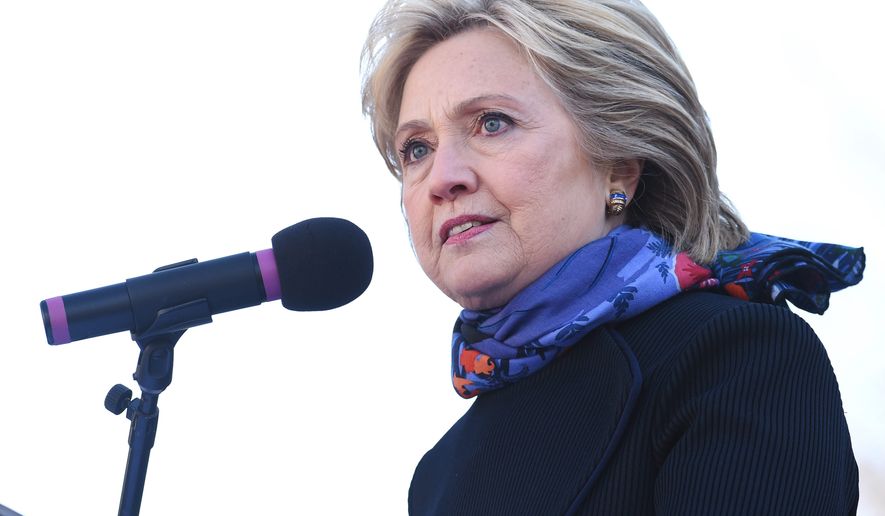Hillary Clinton had little choice but to run as President Obama’s third term, political analysts said after the Democratic presidential hopeful stepped up her defense of her political opponent-turned boss in this weekend’s debate.
Hugging tightly to Mr. Obama, Mrs. Clinton vowed to defend his health care law, praised his handling of foreign affairs and even gave tacit approval to his decision to back away from his “red line” on Syria’s use of chemical weapons.
Her goal, political pros said, is to try to cover her own weaknesses as a candidate by using Mr. Obama as a wedge against her chief opponent, Sen. Bernard Sanders.
“She is casting herself as the third term because she needs Obama’s voters to turn out to vote. She thinks that if she says, ’I’ll be like Obama, and the Republicans can’t be trusted,’ then the majority of the American people will vote for her by default,” said Lara Brown, a political science professor at George Washington University. “She needs to run this campaign because she can’t change her image — like an incumbent, she is well known, and, like many [incumbents], not all that well liked.”
For much of the campaign, Mrs. Clinton had spoken evasively, appearing to seek areas where she could put distance between herself and the president. And some of those differences remain, including on free trade, where she’s said she would reject his Asian deal, and immigration, where she’s said he could have gone further in halting deportations.
But on Sunday, as she, Mr. Sanders and former Maryland Gov. Martin O’Malley squared off in a debate in South Carolina, those differences were forgotten, and Mrs. Clinton defended the president’s Wall Street reforms and Obamacare. She went so far as to accuse Mr. Sanders of threatening to “tear up” Mr. Obama’s health law by proposing a single-payer system instead.
“We’ve accomplished so much already. I do not want to see the Republicans repeal it, and I don’t want to see us start over again with a contentious debate. I want us to defend and build on the Affordable Care Act and improve it,” Mrs. Clinton said. “That is one of the greatest accomplishments of President Obama, of the Democratic Party and of our country.”
Mrs. Clinton and Mr. Sanders remain in tight races ahead of the Iowa caucuses Feb. 1 and the New Hampshire primary on Feb. 8. And in a stunning CNN poll released Tuesday night, Mr. Sanders had taken a 27-point lead — 60 percent to 33 percent — over Mrs. Clinton in New Hampshire.
Nationally, Mrs. Clinton has seen her massive lead over Mr. Sanders begin to shrink. Mrs. Clinton had the support of 52 percent of Democrats and Democratic-leaning voters to Mr. Sanders’ 37 percent support in a national Monmouth University poll released Tuesday.
Key pieces of the Obama coalition, including those who identify as liberals and young voters, favor Mr. Sanders over Mrs. Clinton, according to the Monmouth survey and other recent polls. In a general election, Mrs. Clinton surely would need to excite liberals and young voters if she hopes to triumph over the Republican nominee.
But in the primary, Mrs. Clinton does benefit from strong support among at least one major component of the Obama coalition: minority voters.
In the Monmouth poll, Mrs. Clinton increased her advantage over Mr. Sanders among black and Hispanic voters to a 71 percent-to-21 percent margin after holding a 61 percent-to-18 percent lead last month.
Analysts say that advantage could end up being Mrs. Clinton’s long-term path to victory.
“Sanders is aided by the fact that most Super Tuesday contests are open to independent voters — a group where he performs well. On the other hand, about two-thirds of the pledged delegates awarded on March 1 will be from states where black and Latino voters comprise anywhere from one-third to a majority of the electorate” in a Democratic primary, said Patrick Murray, director of the independent Monmouth University Polling Institute in West Long Branch, New Jersey.
“It looks like the demographic dynamic that hurt Clinton in 2008 may be what helps her in 2016,” Mr. Murray said.
Indeed, Mrs. Clinton in 2008 lost the minority vote to Mr. Obama in key primary races across the country. Most notably, she was soundly beaten in the South Carolina primary among black voters, 78 percent of whom broke for Mr. Obama.
This year minority voters help to form Mrs. Clinton’s supposed “firewall” in South Carolina, where her campaign expects to squash any momentum Mr. Sanders may have picked up in Iowa and New Hampshire.
In the meantime, analysts say Mrs. Clinton is wise to align herself with the president as a way to counteract Mr. Sanders’ support among progressives in Iowa and independents who can vote in the New Hampshire primary.
“First things first — given that neither of these states have a lot of minority voters, she has to find a way to get those Democrats who like Obama,” said Lee Miringoff, director of the Marist Institute for Public Opinion at New York’s Marist College. “By aligning herself with the president, that makes for a very good primary strategy, especially in those two states.”
• David Sherfinski contributed to this report.
• Ben Wolfgang can be reached at bwolfgang@washingtontimes.com.




Please read our comment policy before commenting.